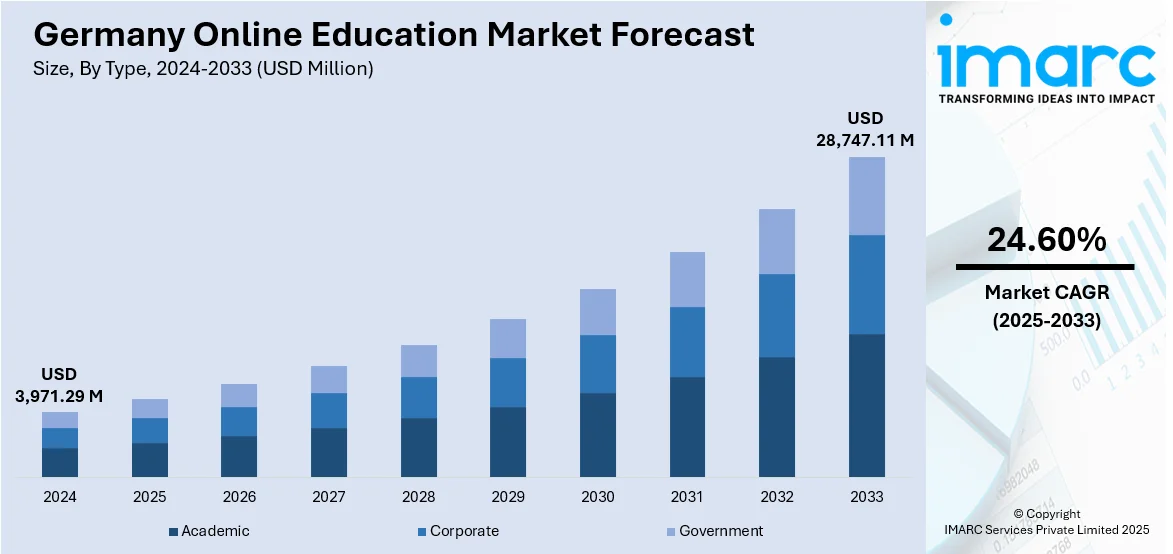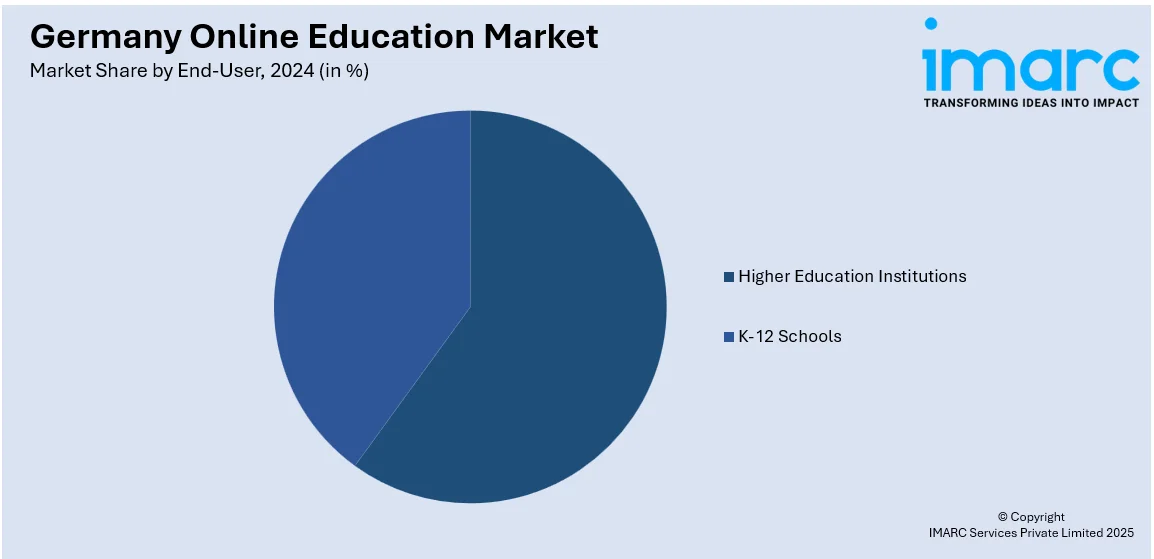
Germany Online Education Market Size, Share, Trends and Forecast by Type, Provider, Technology, End-User, and Region, 2025-2033
Germany Online Education Market Overview:
The Germany online education market size reached USD 3,971.29 Million in 2024. Looking forward, IMARC Group expects the market to reach USD 28,747.11 Million by 2033, exhibiting a growth rate (CAGR) of 24.60% during 2025-2033. The market is driven by comprehensive government digitalization programs improving access to online educational tools, particularly through national initiatives supporting school and university modernization. Rapid corporate adoption of digital platforms for employee upskilling, coupled with growing partnerships between companies and academic institutions, is reshaping learning environments. Rising interest in flexible, personalized lifelong learning formats is further augmenting the Germany online education market share.
|
Report Attribute
|
Key Statistics
|
|---|---|
|
Base Year
|
2024
|
|
Forecast Years
|
2025-2033
|
|
Historical Years
|
2019-2024
|
| Market Size in 2024 | USD 3,971.29 Million |
| Market Forecast in 2033 | USD 28,747.11 Million |
| Market Growth Rate 2025-2033 | 24.60% |
Germany Online Education Market Trends:
Digitalization of Education Sector and Policy Support
Germany’s increasing focus on the digitalization of its education sector is playing a pivotal role in shaping the online education landscape. The DigitalPakt Schule initiative, launched by the German federal government, has allocated significant funding for upgrading digital infrastructure in schools and educational institutions. Germany’s online learning platforms market revenue is projected at USD 652.67 million in 2025. The number of users is forecast to reach 14.3 million by 2029, with user penetration rising from 14.3% in 2025 to 17.3% by 2029. The average revenue per user (ARPU) is estimated at USD 55.00 in 2025. These initiatives have accelerated the integration of online platforms into formal education systems, including universities and vocational schools. Schools across Germany have adopted learning management systems and hybrid teaching models to enhance educational accessibility. Furthermore, institutions are collaborating with private edtech providers to diversify online offerings and create interactive content. This government-backed shift toward digital learning has transformed Germany’s educational environment by improving both accessibility and content quality. As digital competencies increasingly become central to academic and professional success, institutional reforms in Germany are consistently propelling Germany online education market growth, reinforcing the shift toward hybrid and fully digital education frameworks at all levels of learning.

To get more information on this market, Request Sample
Rising Demand for Personalized and Lifelong Learning
There is a growing cultural emphasis in Germany on lifelong learning and continuous skill development, which is contributing significantly to the adoption of online education. Professionals in various sectors are increasingly engaging with modular, self-paced online programs to refine both technical and soft skills. According to a recent 2024 industry report, Germany outperforms the EU average in both digital skills metrics. Although the share of ICT specialists in the workforce declined slightly from 5.0% to 4.9% over the past year, it still remains above the EU average of 4.8%. The demand for personalized learning journeys is further driven by AI-powered educational platforms that adapt content based on individual progress and competencies. Language learning platforms and digital upskilling courses targeting emerging fields—such as renewable energy technologies, data science, and green finance—are experiencing strong adoption. Universities are also expanding their online offerings, including micro-credentials, executive programs, and hybrid degrees, to cater to adult learners seeking flexible yet accredited educational pathways. Additionally, partnerships between German institutions and international universities provide learners with access to globally recognized qualifications. This growing preference for personalized, competency-driven education highlights how online learning is aligning with the professional development priorities of Germany’s evolving labor force.
Germany Online Education Market Segmentation:
IMARC Group provides an analysis of the key trends in each segment of the market, along with forecasts at the country and regional levels for 2025-2033. Our report has categorized the market based on type, provider, technology, and end-user.
Type Insights:
- Academic
- Higher Education
- Vocational Training
- K-12 Education
- Corporate
- Large Enterprises
- SMBs
- Government
The report has provided a detailed breakup and analysis of the market based on the type. This includes academic (higher education, vocational training, and K-12 education), corporate (large enterprises and SMBs), and government.
Provider Insights:
- Content
- Services
The report has provided a detailed breakup and analysis of the market based on the provider. This includes content and services.
Technology Insights:
- Mobile E-Learning
- Rapid E-Learning
- Virtual Classroom
- Others
The report has provided a detailed breakup and analysis of the market based on the technology. This includes mobile e-learning, rapid e-learning, virtual classroom, and others.
End-User Insights:

- Higher Education Institutions
- K-12 Schools
The report has provided a detailed breakup and analysis of the market based on the end-user. This includes higher education institutions and K-12 schools.
Regional Insights:
- Western Germany
- Southern Germany
- Eastern Germany
- Northern Germany
The report has also provided a comprehensive analysis of all major regional markets. This includes Western Germany, Southern Germany, Eastern Germany, and Northern Germany.
Competitive Landscape:
The market research report has also provided a comprehensive analysis of the competitive landscape. Competitive analysis such as market structure, key player positioning, top winning strategies, competitive dashboard, and company evaluation quadrant has been covered in the report. Also, detailed profiles of all major companies have been provided.
Germany Online Education Market Report Coverage:
| Report Features | Details |
|---|---|
| Base Year of the Analysis | 2024 |
| Historical Period | 2019-2024 |
| Forecast Period | 2025-2033 |
| Units | Million USD |
| Scope of the Report |
Exploration of Historical Trends and Market Outlook, Industry Catalysts and Challenges, Segment-Wise Historical and Future Market Assessment:
|
| Types Covered |
|
| Providers Covered | Content, Services |
| Technologies Covered | Mobile E-Learning, Rapid E-Learning, Virtual Classroom, Others |
| End-Users Covered | Higher Education Institutions, K-12 Schools |
| Regions Covered | Western Germany, Southern Germany, Eastern Germany, Northern Germany |
| Customization Scope | 10% Free Customization |
| Post-Sale Analyst Support | 10-12 Weeks |
| Delivery Format | PDF and Excel through Email (We can also provide the editable version of the report in PPT/Word format on special request) |
Key Questions Answered in This Report:
- How has the Germany online education market performed so far and how will it perform in the coming years?
- What is the breakup of the Germany online education market on the basis of type?
- What is the breakup of the Germany online education market on the basis of provider?
- What is the breakup of the Germany online education market on the basis of technology?
- What is the breakup of the Germany online education market on the basis of end-user?
- What is the breakup of the Germany online education market on the basis of region?
- What are the various stages in the value chain of the Germany online education market?
- What are the key driving factors and challenges in the Germany online education market?
- What is the structure of the Germany online education market and who are the key players?
- What is the degree of competition in the Germany online education market?
Key Benefits for Stakeholders:
- IMARC’s industry report offers a comprehensive quantitative analysis of various market segments, historical and current market trends, market forecasts, and dynamics of the Germany online education market from 2019-2033.
- The research report provides the latest information on the market drivers, challenges, and opportunities in the Germany online education market.
- Porter's five forces analysis assist stakeholders in assessing the impact of new entrants, competitive rivalry, supplier power, buyer power, and the threat of substitution. It helps stakeholders to analyze the level of competition within the Germany online education industry and its attractiveness.
- Competitive landscape allows stakeholders to understand their competitive environment and provides an insight into the current positions of key players in the market.
Need more help?
- Speak to our experienced analysts for insights on the current market scenarios.
- Include additional segments and countries to customize the report as per your requirement.
- Gain an unparalleled competitive advantage in your domain by understanding how to utilize the report and positively impacting your operations and revenue.
- For further assistance, please connect with our analysts.
 Request Customization
Request Customization
 Speak to an Analyst
Speak to an Analyst
 Request Brochure
Request Brochure
 Inquire Before Buying
Inquire Before Buying




.webp)




.webp)












